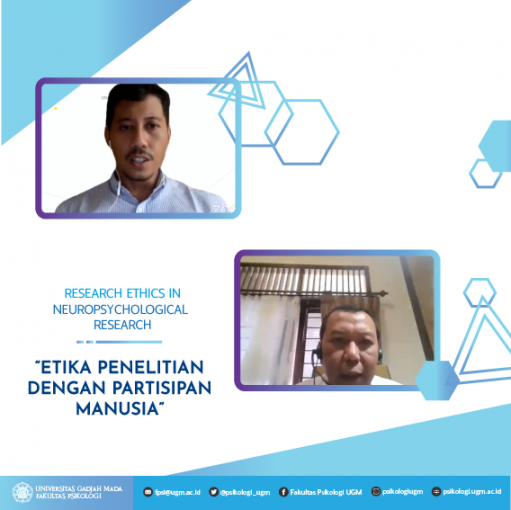
Psychology Doctoral Program, Faculty of Psychology UGM held an event entitled “Research Ethics with Human Participants” which took place on Thursday (25/2) and Friday (26/2). This event was held for two days and was attended by various participants who came from various educational and professional backgrounds.
The first session on Thursday starts at 10.00 WIB. In the opening session, the material was delivered by Dra. Sri Kusrohmaniah, M.Si., Ph.D. with the topic “Research Ethics with Human Participants”. Some of the things that were conveyed by Sri included ethics that guaranteed the safety of subject, both humans and animals. Apart from that, the research design must also be seen by the Ethics Committee. “Human participants need to be highlighted because in Psychology a lot of research is done with humans. However, it does not rule out that Psychology learning can be done using animal as asubjects, so it does not always use humans. Especially for the behavior and cellular level, ”especially Sri.
In the second session which started at 13.00 WIB discussed the topic “Research Ethics in Neuropsychological Research” by Galang Lufityanto, M.Psi., Ph.D. Galang explained that informed consent contains three things, namely informative, understanding, and volunteerism. Informative means that informed consent contains information needed by participants to assess participation in a study is safe. “Informative will later relate to volunteerism, that the participants who then take part in our research are participants who are willing to join by having seen all the information,” explained Galang.
On the second day, the event started at 13.00 and was filled by prof. Dra. R. A. Yayi Suryo Prabandari, M.Si., Ph.D. who delivered “Research Ethics for the Field of Social Sciences”. Yayi explained general ethical principles consisting of respect for people, goodness that is not evil, and justice. “Before taking data, researchers need to submit approval to research subjects. This is done as a first step to protect individuals from things that violate their autonomy, ”explained Yayi. In addition, according to Yayi, research must also benefits, minimize risks, and treat subjects fairly.
This event is part of the curriculum of the UGM Psychology Doctoral Study Program and also as an implementation of the independent learning program. By opening the event to the public, the committee hopes to get broad thoughts from various participants.
At the final event, as the Head of the Psychological Science Doctoral Program, Rahmat Hidayat, S.Psi., M.Sc., Ph.D. closes and summarizes the two-day event. The hope is that this series of events can make researchers aware of the commission and review the rights of participants, both at the individual and institutional level.
